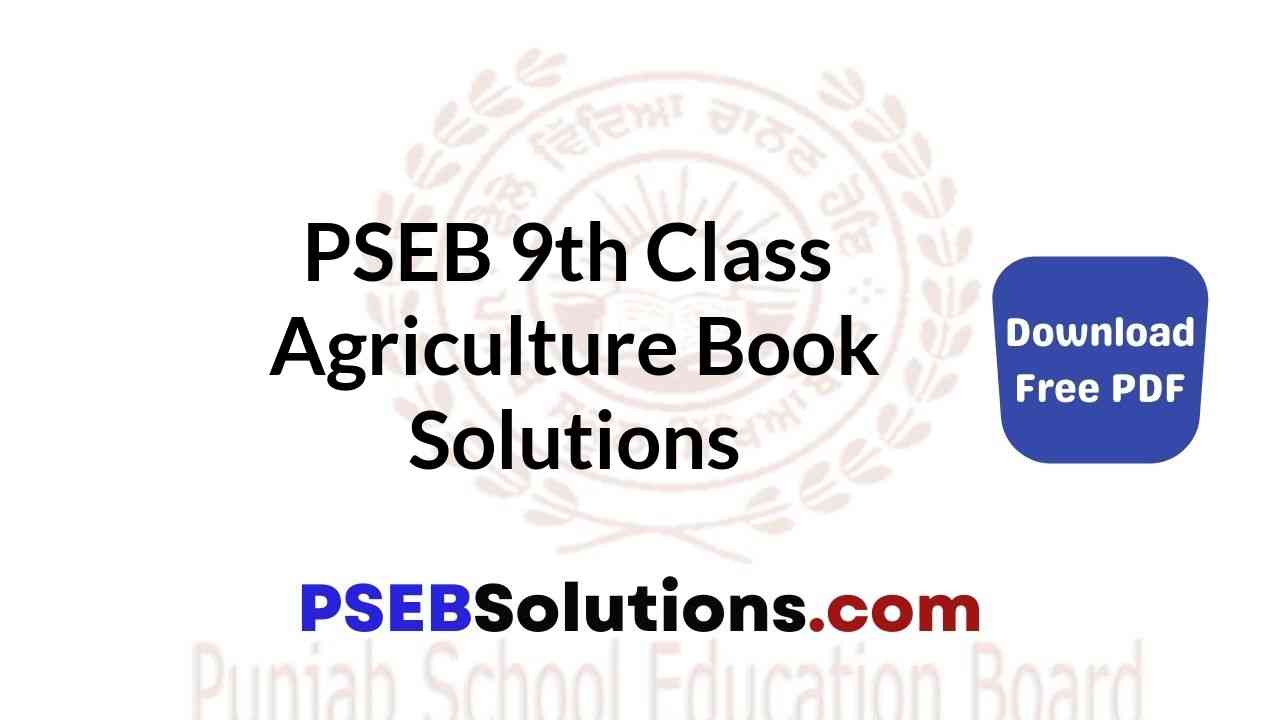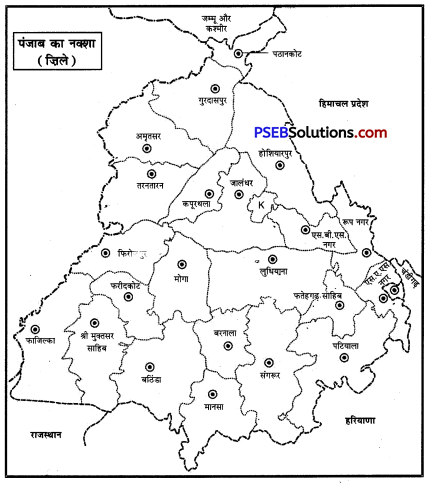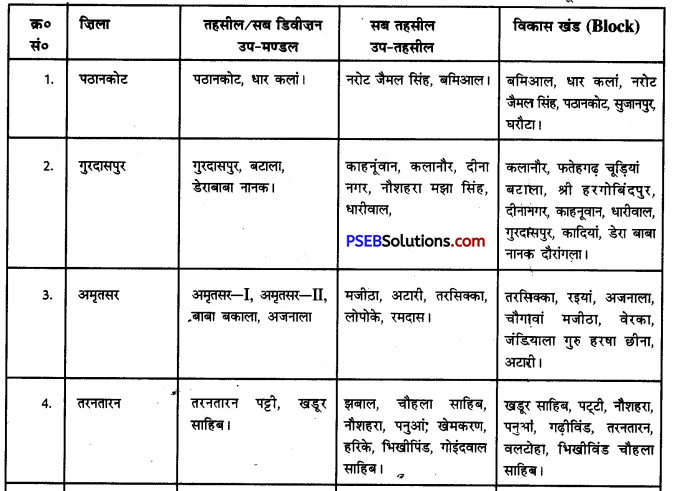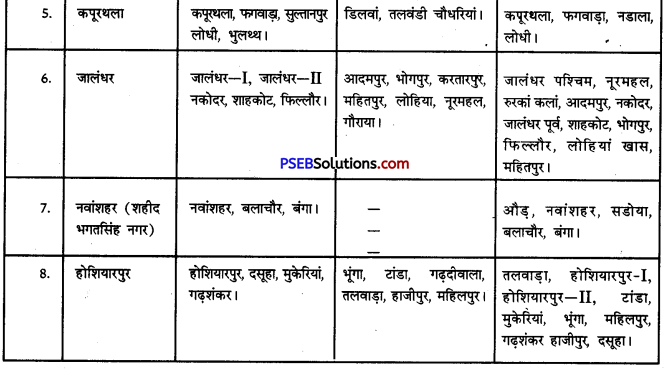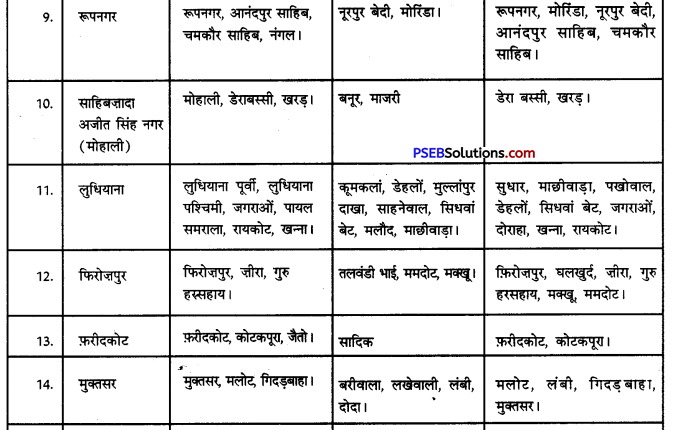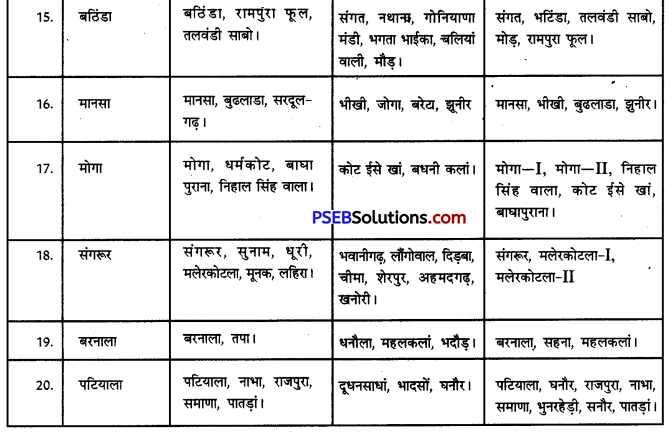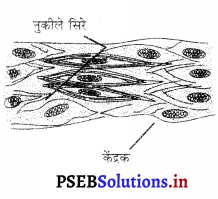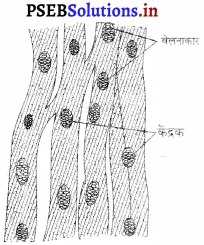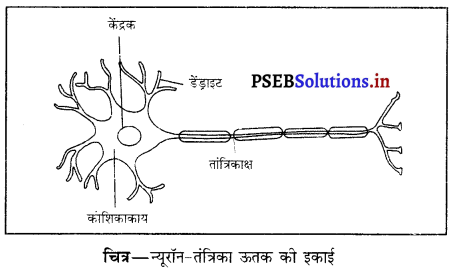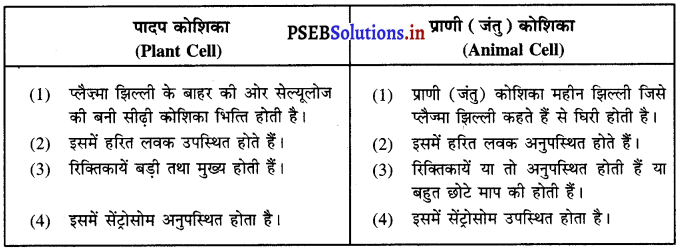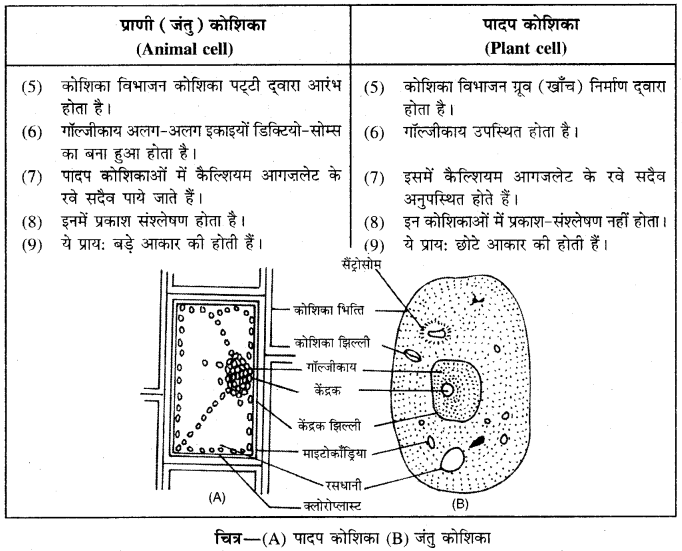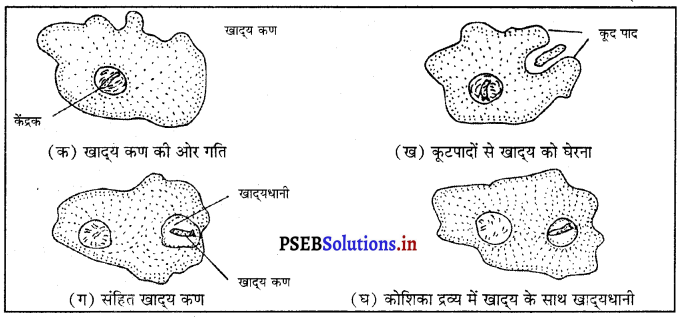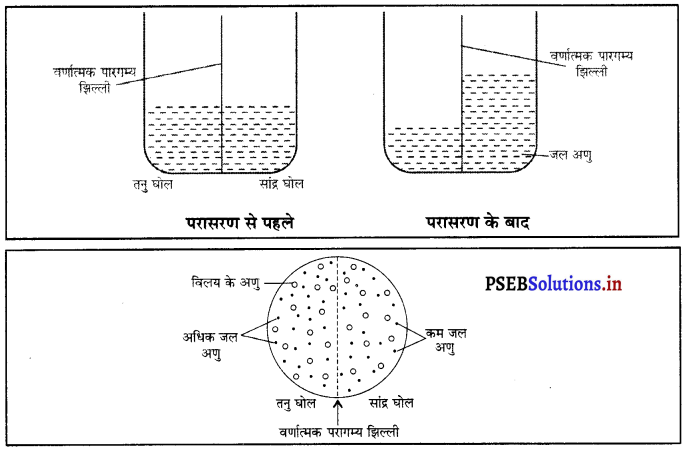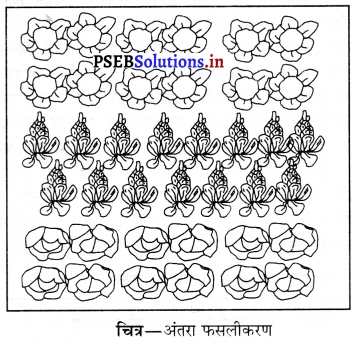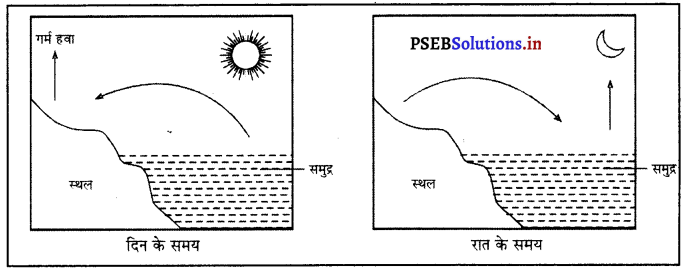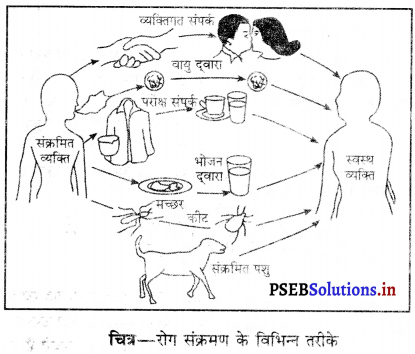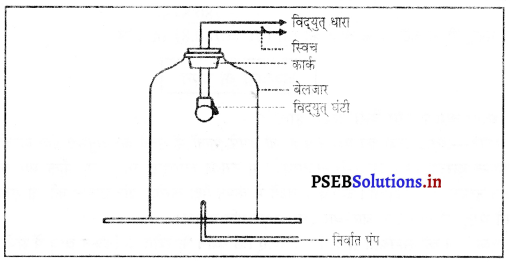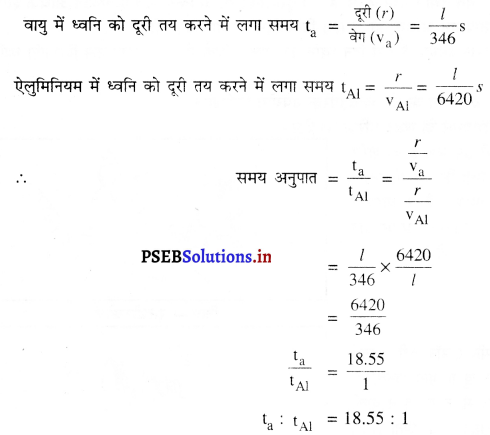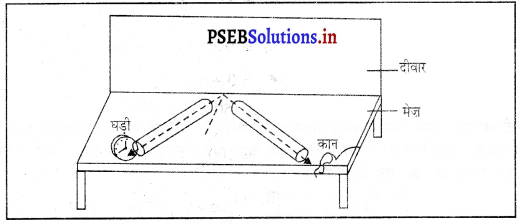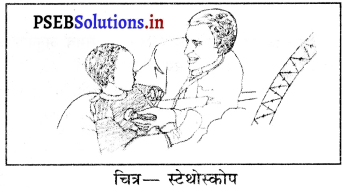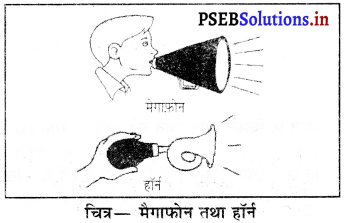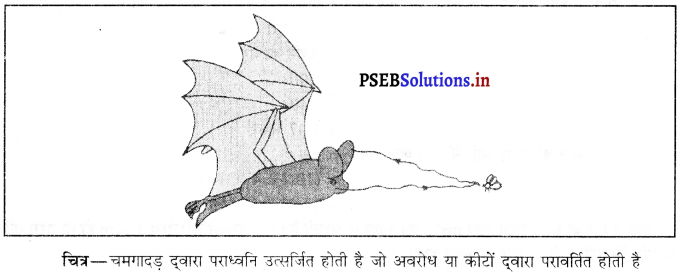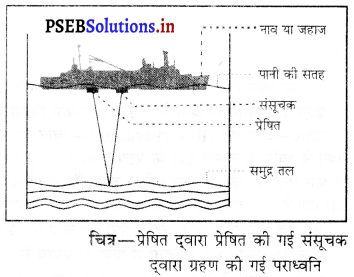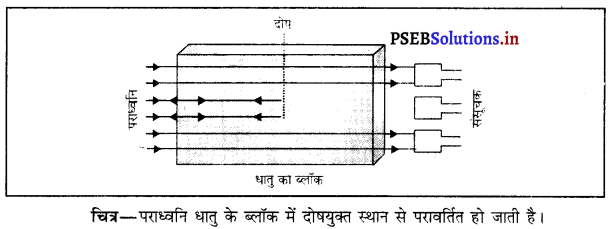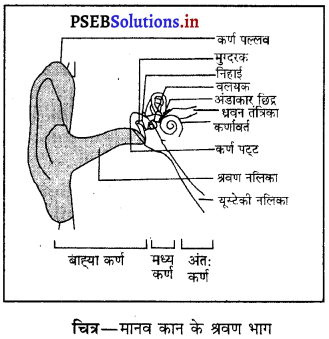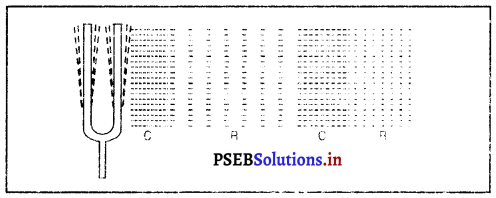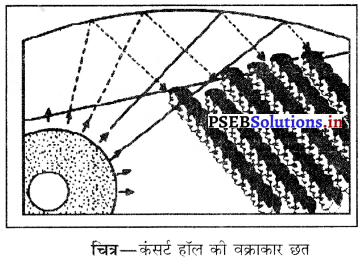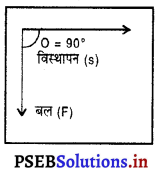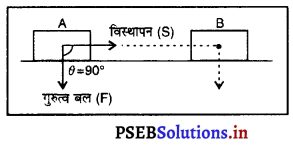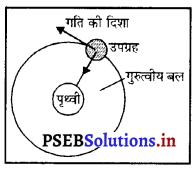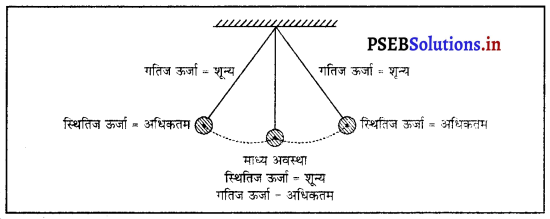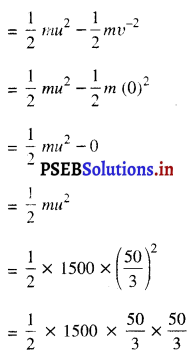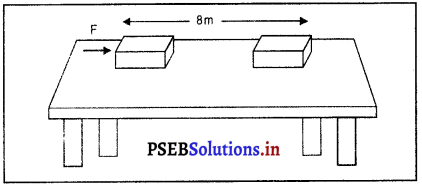Punjab State Board PSEB 9th Class Social Science Book Solutions Civics Chapter 1 वर्तमान लोकतंत्र का इतिहास, विकास एवं विस्तार Textbook Exercise Questions and Answers.
PSEB Solutions for Class 9 Social Science Civics Chapter 1 वर्तमान लोकतंत्र का इतिहास, विकास एवं विस्तार
SST Guide for Class 9 PSEB वर्तमान लोकतंत्र का इतिहास, विकास एवं विस्तार Textbook Questions and Answers
(क) रिक्त स्थान भरें :
- चोल शासकों के समय प्रशासन की सबसे छोटी इकाई ………. थी।
- ………….. ने चिल्ली में सोशलिस्ट पार्टी का मार्गदर्शन किया।
उत्तर-
- उरर
- साल्वाडोर एलैंडे।
(ख) निम्नलिखित कथनों में सही के लिए तथा गलत के लिए चिन्ह लगाएं :
- भारत संयुक्त राष्ट्र संघ की सुरक्षा परिषद् का स्थायी सदस्य है। ( )
- हमारे पड़ोसी देश पाकिस्तान में लोकतंत्र निरंतर चल रहा है। ( )
उत्तर-
- (✗)
- (✗)
(ग) बहुविकल्पीय प्रश्न :
प्रश्न 1.
निम्नलिखित में किस देश ने दुनिया के देशों को संसदीय लोकतंत्र प्रणाली अपनाने की प्रेरणा दी :-
(अ) जर्मनी
(आ) फ्रांस
(इ) इंग्लैंड
(ई) चीन।
उत्तर-
(इ) इंग्लैंड

प्रश्न 2.
निम्नलिखित देशों में ‘वीटो शक्ति’ किस देश के पास नहीं है ?
(अ) भारत
(आ) अमेरिका
(इ) फ्रांस
(ई) चीन।
उत्तर-
(अ) भारत
अति लघु उत्तरों वाले प्रश्न
प्रश्न 1.
आजकल विश्व के अधिकांश राष्ट्रों में कौन-सी शासन प्रणाली अपनाई जा रही है ?
उत्तर-
आजकल विश्व के अधिकांश राष्ट्रों में लोकतंत्र को अपनाया जा रहा है।
प्रश्न 2.
प्रथम विश्व युद्ध के पश्चात् इटली व जर्मनी में प्रचलित विचारधाराओं के नाम लिखें जिनके कारण लोकतंत्र को भीषण झटका लगा।
उत्तर–
इटली में फासीवाद तथा जर्मनी में नाजीवाद।
प्रश्न 3.
एलैंडे चिल्ली का राष्ट्रपति कब चुना गया ?
उत्तर-
एलैंडे 1970 में चिल्ली का राष्ट्रपति चुना गया।
प्रश्न 4.
चिल्ली में लोकतंत्र की पुनर्स्थापना कब हुई थी ?
उत्तर-
चिल्ली में लोकतंत्र की पुनर्स्थापना 1988 में हुई थी।
प्रश्न 5.
पोलैंड में लोकतांत्रिक अधिकारों की मांग के लिए हड़ताल की कार्यवाही किसने की ?
उत्तर-
लेक वालेशा (Lek Walesha) ने तथा सोलिडैरिटी (Solidarity) ने पोलैंड में हड़ताल की कार्यवाही की।
प्रश्न 6.
पोलैंड में राष्ट्रपति पद के लिए प्रथम बार चुनाव कब हुआ तथा राष्ट्रपति पद के लिए कौन निर्वाचित हुआ ?
उत्तर-
पोलैंड में राष्ट्रपति पद के लिए प्रथम बार चुनाव 1990 में हुए तथा लेक वालेशा राष्ट्रपति बने।
प्रश्न 7.
भारत में सर्वव्यापक वयस्क मताधिकार कब दिया गया ?
उत्तर-
1950 में संविधान के लागू होने के साथ।
प्रश्न 8.
कौन-से दो बड़े महाद्वीप उपनिवेशवाद का शिकार रहे हैं ?
उत्तर-
एशिया तथा अफ्रीका उपनिवेशवाद का शिकार रहे हैं।
प्रश्न 9.
दक्षिणी अफ्रीका महाद्वीप के देश घाना को स्वतंत्रता कब प्राप्त हुई ?
उत्तर-
घाना को 1957 में स्वतंत्रता प्राप्त हुई।

प्रश्न 10.
हमारे पड़ोसी देश पाकिस्तान में किस सैनिक कमांडर ने 1999 में निर्वाचित सरकार की सत्ता पर अधिकार कर लिया ?
उत्तर-
जनरल परवेज मुशर्रफ ने।
प्रश्न 11.
दो अंतर्राष्ट्रीय संस्थाओं के नाम लिखें।
उत्तर-
संयुक्त राष्ट्र संघ, अंतर्राष्ट्रीय मुद्रा कोष।
प्रश्न 12.
अंतर्राष्ट्रीय मुद्रा कोष कार्य करती है ?
उत्तर-
अंतर्राष्ट्रीय मुद्रा कोष अलग-अलग देशों को विकास के लिए धन कर्जे के रूप में देती है।
प्रश्न 13.
संयुक्त राष्ट्र संघ में कितने राष्ट्र सदस्य हैं ?
उत्तर-
संयुक्त राष्ट्र संघ में 193 राष्ट्र सदस्य हैं।
प्रश्न 14.
विश्व भर में प्रचलित शासन प्रणालियों के नाम लिखें।
उत्तर-
राजतंत्र, सत्तावादी, सर्वसत्तावादी, तानाशाही, सैनिक तानाशाही तथा लोकतंत्र।
लघु उत्तरों वाले प्रश्न
प्रश्न 1.
सर्वव्यापक वयस्क मताधिकार से आपका क्या अभिप्राय है ?
उत्तर-
देश के सभी नागरिकों को जाति, लिंग, जन्म, वर्ण, प्रजाति के भेदभाव के बिना एक निश्चित आयु प्राप्त करने के पश्चात् चुनाव में वोट देने का अधिकार दिया जाता है जिसे सर्वव्यापक वयस्क मताधिकार कहते हैं। भारत में 18 वर्ष की आयु होने के पश्चात् सभी को बिना किसी भेदभाव के वोट या मत देने का अधिकार प्रदान किया गया है।
प्रश्न 2.
चौल वंश के शासकों के समय स्थानीय स्तर के लोकतंत्र पर नोट लिखें।
उत्तर-
चोल शासकों ने शासन को ठीक ढंग से चलाने के लिए राज्य को कई इकाइयों में विभाजित किया था तथा इन प्रशासनिक इकाइयों को स्वायत्तता का अधिकार प्रदान किया था। उन्होंने स्थानीय व्यवस्था को चलाने के लिए समिति प्रणाली शुरू की जिसे ‘वरियाम व्यवस्था’ कहते थे। अलग-अलग कार्यों के लिए अलग-अलग समितियां गठित की जाती थीं। प्रशासन की सबसे छोटी इकाई (उर्र) का प्रबंध चलाने के लिए 30 सदस्यों की समिति को उरी के वयस्कों द्वारा एक वर्ष के लिए चुना जाता था। प्रत्येक उरी को खंडों में विभाजित किया जाता था जिनके उम्मीदवारों का चुनाव जनता द्वारा किया जाता था।
प्रश्न 3.
वीटो शक्ति से क्या अभिप्राय है ? संयुक्त राष्ट्र संघ में वीटो शक्ति किन राष्ट्रों के पास है ?
उत्तर-
वीटो शक्ति का अर्थ है ‘न कहने की शक्ति’। इसका अर्थ यह है कि जिसे वीटो शक्ति प्रयोग करने का अधिकार हो तो उसकी मर्जी के बिना कोई प्रस्ताव पारित नहीं हो सकता। संयुक्त राष्ट्र की सुरक्षा परिषद् के पांच स्थायी सदस्यों को वीटो शक्ति का अधिकार प्राप्त है। अगर इन पांच सदस्यों में से कोई भी सदस्य वीटो के अधिकार का प्रयोग करता है तो वह प्रस्ताव परिषद् में पारित नहीं किया जा सकता। वह देश जिन्हें वीटो अधिकार प्राप्त है वह है-संयुक्त राज्य अमेरिका, रूस, इंग्लैंड, फ्रांस तथा चीन।
प्रश्न 4.
हमारे पड़ोसी देश पाकिस्तान में लोकतंत्र के इतिहास पर नोट लिखें।
उत्तर–
पाकिस्तान 1947 में भारत को विभाजित करके बनाया गया था तथा वहां पर लोकतंत्र का इतिहास काफी अच्छा नहीं है। पाकिस्तान में सेना काफी शक्तिशाली है तथा उसका राजनीति में काफी प्रभुत्व है। 1958 में प्रधानमंत्री फिरोज़ खान नून को हटा कर सेना प्रमुख जनरल अयूबखान को देश का प्रमुख बना दिया गया। इसके पश्चात् 1977 में जनता द्वारा चुने गए प्रधानमंत्री जुल्फिकार अली भुट्टो को सेना प्रमुख जनरल जिया उल हक ने हटा दिया तथा स्वयं को देश का राष्ट्रपति बना दिया। 1999 में इसी प्रकार प्रधानमंत्री नवाज़ शरीफ को सेना प्रमुख जनरल परवेज़ मुशर्रफ ने हटा दिया तथा 2002 में स्वयं को राष्ट्रपति घोषित कर दिया। इस प्रकार वहां पर समय समय पर सेना द्वारा लोकतंत्र का गला घोटा गया है।
प्रश्न 5.
चिल्ली के लोकतंत्र के इतिहास पर नोट लिखें।
उत्तर-
चिल्ली दक्षिण अमेरिकी देश है जहां पर साल्वाडोर एलैंडे की सोशलिस्ट पार्टी को 1970 में राष्ट्रपति चुनाव में विजय प्राप्त हुई। इसके पश्चात् एलैंडे ने निर्धन लोगों के कल्याण, शिक्षा में सुधार तथा कई अन्य कार्य किए जिसका विदेशी कंपनियों ने विरोध किया। 11 सितंबर 1973 को सैनिक जनरल पिनोशे ने षड्यंत्र रच कर तख्ता पलट किया जिसमें एलैंडे की मृत्यु हो गई। सत्ता पिनोशे के हाथों में आ गई। 17 वर्ष तक राज करने के पश्चात् पिनोशे ने जनमत संग्रह करवाया जो उसके विरोध में गया। 1990 में वहां पर चुनाव हुए तथा लोकतंत्र स्थापित हुआ।
प्रश्न 6.
अफ्रीका महाद्वीप के देश ‘घाना’ की स्वतंत्रता के लिए किस व्यक्ति ने महत्त्वपूर्ण भूमिका निभाई? घाना की स्वतंत्रता का अफ्रीका के अन्य देशों पर क्या प्रभाव पड़ा ?
उत्तर-
घाना को 1957 में अंग्रेजों से स्वतंत्रता प्राप्त हुई। उसकी स्वतंत्रता प्राप्ति में कवामे नकरूमाह (Kwame Nkrumah) नामक व्यक्ति ने महत्त्वपूर्ण भूमिका निभाई। उसने स्वतंत्रता के संघर्ष का नेतृत्व किया तथा अपने देश को स्वतंत्र करवाया। वह घाना का प्रथम प्रधानमंत्री तथा बाद में राष्ट्रपति बन गया। घाना की स्वतंत्रता का अफ्रीका के अन्य देशों पर काफी प्रभाव पड़ा तथा वह भी स्वतंत्रता प्राप्त करने के लिए प्रेरित हुए तथा उन्हें समय के साथसाथ स्वतंत्रता प्राप्त हो गई।
प्रश्न 7.
चोल वंश के शासकों के समय स्थानीय संस्थाओं के प्रतिनिधियों के चुनाव के लिए अपनाई गई निर्वाचन पद्धति का वर्णन करें।
उत्तर-
चोल वंश के शासकों में शासन की सबसे छोटी इकाई उरी थी जो आजकल के गांवों के समान हुआ करते थे। उर का प्रबंध चलाने के लिए 30 सदस्यों की समिति बनाई जाती थी जिसे एक वर्ष के लिए उरी के वयस्कों द्वारा चुना जाता था। प्रत्येक उरी 30 खंडों में विभाजित होता है तथा प्रत्येक खंड में से एक से अधिक उम्मीदवार की सिफारिश जनता द्वारा की जाती थी। इन उम्मीदवारों के नाम ताड़ के पत्तों पर लिख कर एक डिब्बे में डाल दिए जाते थे जिनके नाम बालिगों द्वारा डिब्बे में से बाहर निकाले जाते थे। उन्हें सदस्य मान लिया जाता था। इस निर्वाचन के ढंग को कदूबलाय का नाम दिया जाता था।
दीर्घ उत्तरों वाले प्रश्न
प्रश्न 1.
‘अंतर्राष्ट्रीय मुद्रा कोष’ पर संक्षिप्त निबंध लिखें।
उत्तर-
अंतर्राष्ट्रीय मुद्रा कोष तथा वर्ल्ड बैंक को ब्रैटन वुड संस्थाएं कहा जाता है। अंतर्राष्ट्रीय मुद्रा कोष (Internatinal Monetary Fund) ने 1947 में अपने आर्थिक कार्य करने शुरू किए। इन संस्थाओं में निर्णय लेने की प्रक्रिया पर पश्चिमी देशों का अधिकार होता है। संयुक्त राज्य अमेरिका के पास IMF तथा वर्ल्ड बैंक में वोट करने का मुख्य अधिकार है।
यह संस्था संसार भर के देशों को कर्जा देती है। इस संस्था के 188 देश सदस्य हैं तथा प्रत्येक देश के पास मत देने का अधिकार है। प्रत्येक देश के मत की शक्ति उस देश द्वारा संस्था को दी गई राशि के अनुसार निश्चित की जाती है। अंतर्राष्ट्रीय मुद्रा कोष में 52% मत शक्ति केवल 10 देशों-अमेरिका, जापान, जर्मनी, फ्रांस, ब्रिटेन, चीन, इटली, साऊदी अरब, कैनेडा तथा रूस के पास है। इस प्रकार अन्य 178 देशों के पास संस्था में निर्णय लेने का अधिकार काफी कम होता है। इस प्रकार हम कह सकते हैं कि इन देशों में निर्णय लेने की प्रक्रिया लोकतांत्रिक नहीं बल्कि अलोकतांत्रिक है।

प्रश्न 2.
संयुक्त राष्ट्र संघ पर संक्षिप्त निबंध लिखें।
उत्तर-
संयुक्त राष्ट्र संघ एक अंतर्राष्ट्रीय संस्था है जिसे 24 अक्तूबर, 1945 को द्वितीय विश्व युद्ध के पश्चात् बनाया गया था। इसके प्राथमिक सदस्यों की संख्या 51 थी तथा भारत भी इन 51 देशों में से था। संयुक्त राष्ट्र उन प्रयासों का परिणाम था जिसमें विश्व शांति को सामने रख कर युद्धों को रोकने का प्रयास किया गया था। इस समय इसके 193 देश सदस्य हैं।
संयुक्त राष्ट्र की एक संसद् है जिसे संयुक्त राष्ट्र महासभा कहते हैं। यहां प्रत्येक देश को एक मत, एक समान मताधिकार प्राप्त है तथा महासभा में सभी देश विश्व की समस्याओं से संबंधित विचार विमर्श करते हैं। महासभा का एक प्रधान होता है जिसे चेयरमैन कहा जाता है। संयुक्त राष्ट्र का एक सचिवालय होता है जिसके प्रमुख को महासचिव कहते हैं। सभी निर्णय अलग-अलग देशों से परामर्श करके किए जाते हैं। इसके कुछेक अंग हैं-जैसे कि महासभा, सुरक्षा परिषद्, आर्थिक एवं सामाजिक परिषद, ट्रस्टीशिप कौंसिल, अंतर्राष्ट्रीय न्यायालय तथा सचिवालय।
प्रश्न 3.
यूनान व रोम में प्राचीनकाल में लोकतंत्र के विकास पर संक्षेप नोट लिखें।
उत्तर-
अगर हम संपूर्ण विश्व में लोकतंत्र के आरंभ को देखें तो यह यूनान तथा रोमन गणराज्यों में हुआ था। प्राचीन समय में यूनान में नगर राज्यों में सीधा तथा प्रत्यक्ष लोकतंत्र लागू था। इन राज्यों की जनसंख्या काफी कम थी। राज्य के प्रशासनिक निर्णय नागरिक प्रत्यक्ष रूप से लेते थे। राज्य के सभी नागरिक अपने राज्य की आर्थिक, राजनीतिक तथा सामाजिक समस्याओं को हल करने के लिए कानून बनाने, राज्य के वार्षिक बजट को पास करने तथा सार्वजनिक नीतियों के निर्माण की प्रक्रिया में भाग लेते थे।
परंतु यह लोकतंत्र एक सीमित लोकतंत्र था क्योंकि इन नगर राज्यों की जनसंख्या का बहुत बड़ा हिस्सा गुलामों का होता था। गुलामों का प्रशासनिक कार्यों में भाग लेना वर्जित था। रोमन राज्यों में राजा को चाहे लोगों के द्वारा निर्वाचित किया जाता था। परंतु यहां पर राजा अपनी इच्छा से राज्य का प्रशासन चलाता था। सैद्धांतिक रूप से तो राजा संपूर्ण जनता का प्रतिनिधित्व करता था परंतु वास्तविक रूप में वह अपनी इच्छा से शासक प्रबंध चलाता था।
प्रश्न 4.
बहुराष्ट्रीय कंपनियां आधुनिक युग में लोकतंत्र को खतरा हैं-इसकी व्याख्या करें।
उत्तर-
आजकल का समय विश्वव्यापीकरण का समय है जब जहां अलग-अलग देशों की एक-दूसरे के ऊपर निर्भरता बढ़ गई है। बहुत सी बहुराष्ट्रीय कंपनियां भी सामने आई हैं जो बहुत से देशों में अपना व्यापार करती हैं। परंतु प्रश्न यह उठता है कि क्या ये कंपनियां लोकतंत्र के लिए खतरा हैं। आजकल लगभग सभी विकासशील तथा पिछड़े देशों ने वैश्वीकरण तथा खुली प्रतिस्पर्धा की नीति को अपना लिया है। इस नीति के अनुसार ही बहुराष्ट्रीय कंपनियां अपना व्यापार कर रही हैं। इन कंपनियों का मुख्य उद्देश्य अधिक से अधिक लाभ कमाना होता है जिस कारण यह अपनी वस्तुओं के दाम लगातार बढ़ाते रहते हैं। ये कंपनियां किसी न किसी ढंग से जनता का शोषण करती हैं जो कि लोकतंत्र की आत्मा के विरुद्ध है।
हमारी सरकारें चाहे स्वयं को लोकतांत्रिक कह लें परंतु इन्हें देश के व्यापारिक परिवार ही चला रहे हैं। इन व्यापारिक परिवारों का उन कंपनियों पर एकाधिकार होता है तथा यह सरकार से अपने पक्ष में नीतियां बनवा लेते हैं। इस कारण यह और अमीर तथा गरीब और गरीब हो रहा है। यह सब सच्चे लोकतंत्र की आत्मा के विरुद्ध है। इस प्रकार बहुराष्ट्रीय कंपनियां लोकतंत्र के लिए खतरा हैं।
PSEB 9th Class Social Science Guide वर्तमान लोकतंत्र का इतिहास, विकास एवं विस्तार Important Questions and Answers
बहुविकल्पीय प्रश्न :
प्रश्न 1.
चिल्ली (Chile) में 11 सितंबर, 1973 को सेना ने सरकार का तख्ता बदला तब चिली का राष्ट्रपति कौन था ?
(क) गोर्वाचेव
(ख) अगस्टो पिनोशे
(ग) स्टालिन
(घ) सालवेडर एलैंडे।
उत्तर-
(घ) सालवेडर एलैंडे।
प्रश्न 2.
चिल्ली में सैनिक तानाशाही कब समाप्त हुई ?
(क) 1973
(ख) 1989
(ग) 1988
(घ) 1998.
उत्तर-
(ग) 1988
प्रश्न 3.
1980 में पौलेंड में निम्न में से किस पार्टी का शासन था ?
(क) साम्यवादी पार्टी
(ख) पोलिश संयुक्त श्रमिक पार्टी
(ग) पौलिश श्रम पार्टी
(घ) पोलिश प्रगतिशील पार्टी।
उत्तर-
(ख) पोलिश संयुक्त श्रमिक पार्टी
प्रश्न 4.
लेनिन शिपयार्ड (Shipyard) के श्रमिकों ने कब हड़ताल की ?
(क) 14 अगस्त, 1973
(ख) 14 अगस्त, 1980
(ग) 14 अगस्त, 1998
(घ) 14 अगस्त 1988.
उत्तर-
(ख) 14 अगस्त, 1980
प्रश्न 5.
पोलैंड में प्रथम राष्ट्रपति चुनाव कब हुआ जिसमें एक से अधिक दलों को हिस्सा लेने का अधिकार प्राप्त था ?
(क) अक्तूबर, 1990
(ख) अक्तूबर, 1992
(ग) जनवरी, 1998
(घ) अक्तूबर, 1988.
उत्तर-
(क) अक्तूबर, 1990
प्रश्न 6.
सोलिडेरिटी (Solidarity) ट्रेड यूनियन की स्थापना किस देश में की गई थी ?
(क) पोलैंड
(ख) फ्रांस
(ग) नेपाल
(घ) रूमानिया।
उत्तर-
(क) पोलैंड
प्रश्न 7.
पोलैंड में लेक वालेशा (Walesa) की सरकार की महत्त्वपूर्ण विशेषता थी
(क) राजनीतिक सत्ता सेना के पास थी
(ख) लोगों को कुछ मूल राजनीतिक स्वतंत्रताएं प्राप्त थीं
(ग) सरकार की आलोचना करना मना था
(घ) शासक जनता द्वारा नहीं चुने गए थे।
उत्तर-
(ख) लोगों को कुछ मूल राजनीतिक स्वतंत्रताएं प्राप्त थीं
रिक्त स्थान भरें:
- लोकतंत्र का आरंभ ……………. तथा …………………. गणराज्यों में हुआ।
- चोल शासकों के समय स्थानीय प्रबंध चलाने वाली प्रणाली को …………………. प्रणाली कहते थे।
- ………………… ने कहा था कि लोकतंत्रीय सरकार लोगों द्वारा, लोगों के लिए और लोगों द्वारा निर्वाचित होती है।
- भारत से एक नया राष्ट्र …………………. 1947 में बना था।
- ……………. में एलैंडे चिल्ली के राष्ट्रपति निर्वाचित हुए।
- पोलैंड में …. ……. को 1976 में अधिक वेतन की मांग करने पर नौकरी से निकाल दिया गया था।
- ……………….. ने संविधान लागू होते ही जनता को सर्वव्यापक वयस्क मताधिकार प्रदान कर दिया था।
उत्तर-
- यूनानी, रोमन
- वरियाम
- अब्राहम लिंकन
- पाकिस्तान
- 1970
- लेक वालेशा
- भारत

सही/गलत :
- इराक 1932 में अमेरिकी उपनिवेशवाद से स्वतंत्र हुआ।
- अंतर्राष्ट्रीय मुद्रा कोष की 52% मत शक्ति केवल 10 देशों के पास है।
- 1991 में सोवियत संघ के विघटन के कारण अमेरिका महाशक्ति बन गया।
- सुरक्षा परिषद के 15 सदस्यों के पास वीटो शक्ति है।
- संयुक्त राष्ट्र के 100 प्राथमिक सदस्य थे।
- संयुक्त राष्ट्र संघ के 193 सदस्य हैं। .
उत्तर-
- (✗)
- (✓)
- (✓)
- (✗)
- (✗)
- (✓)
अति लघु उत्तरों वाले प्रश्न
प्रश्न 1.
चिल्ली में राष्ट्रपति सालवेडर एलैंडे (Salvader Allende) का तख्ता कब पलटा गया और सैनिक क्रांति किसके नेतृत्व में हुई ?
उत्तर-
11 सितंबर, 1973 को सैनिक क्रांति हुई और सेना का नेतृत्व जनरल अगस्टो पिनोशे (Augusto Pinnochet) ने किया। राष्ट्रपति सालवेडर एलैंडे सैनिक आक्रमण में मारा गया।
प्रश्न 2.
क्या सेना को किसी नागरिक को कैद करने का अधिकार है ?
उत्तर-
सेना को नागरिकों को कैद करने का अधिकार नहीं है।
प्रश्न 3.
चिल्ली में जनरल अगस्टो पिनोशे ने अपने शासन के संबंध में कब जनमत संग्रह (Referendum) करवाया ?
उत्तर-
1988 में जनमत संग्रह करवाया गया और लोगों ने स्पष्ट रूप से जनरल पिनोशे के शासन के विरुद्ध मतदान किया।
प्रश्न 4.
चिल्ली में राजनीतिक स्वतंत्रता पुनः कब स्थापित की गई ?
उत्तर-
1988 में जनमत संग्रह के बाद जनरल पिनोशे की सत्ता समाप्त होने के बाद चिल्ली में राजनीतिक स्वतंत्रता पुनः स्थापित की गई।
प्रश्न 5.
1980 में पोलैंड में किस पार्टी का शासन था ?
उत्तर-
1980 में पोलैंड में पौलिश संयुक्त श्रमिक पार्टी (Polish United Workers Party) का शासन था।
प्रश्न 6.
पोलैंड में संयुक्त श्रमिक पार्टी के शासन में क्या और राजनीतिक दल थे ?
उत्तर-
पोलैंड में 1980 में संयुक्त श्रमिक पार्टी के अतिरिक्त और कोई राजनीतिक दल नहीं था। पोलैंड में किसी और राजनीतिक दल को कार्य करने नहीं दिया जाता था।
प्रश्न 7.
जनवरी 2006 में चिली का राष्ट्रपति कौन चुना गया ?
उत्तर-
मिशेल बेशलेट (Michelle Bachelet) चिली की प्रथम महिला राष्ट्रपति निर्वाचित हुई।
प्रश्न 8.
1988 में पोलैंड में किस ट्रेड यूनियन के नेतृत्व में हड़ताल हुई ?
उत्तर-
सोलिडेरिटी (Solidarity) के नेतृत्व में हड़ताल हुई।
प्रश्न 9.
अलोकतांत्रिक सरकार की एक विशेषता लिखें।
उत्तर-
अलोकतांत्रिक शासन प्रणाली में सरकार जनता द्वारा निर्वाचित नहीं की जाती।
प्रश्न 10.
19वीं शताब्दी में किस देश में लोकतंत्र को कई बार बदला गया और पुनः स्थापित किया गया ?
उत्तर-
19वीं शताब्दी में फ्रांस में उथल-पुथल होती रही।
प्रश्न 11.
किन्हीं दो देशों का नाम लिखें जहाँ पर अलोकतांत्रिक शासन प्रणाली पाई जाती है ?
उत्तर-
- उत्तरी कोरिया
- साम्यवादी चीन।
प्रश्न 12.
समकालीन विश्व में कौन-सी शासन प्रणाली संसार के अधिकांश देशों में पाई जाती है ?
उत्तर-
संसार के अधिकांश देशों में लोकतांत्रिक शासन प्रणाली पाई जाती है।
प्रश्न 13.
अफ्रीका में कौन-सा देश सबसे पहले स्वतंत्र हुआ ?
उत्तर-
घाना 1957 में स्वतंत्र हुआ।
प्रश्न 14.
विश्व में किस महान् देश का विघटन हुआ और सभी प्रांत स्वतंत्र देश बन गए।
उत्तर-
1991 में सोवियत संघ का विघटन हुआ और 15 स्वतंत्र देशों का उदय हुआ।
प्रश्न 15.
एशिया के किस देश में 2005 में निर्वाचित सरकार को अपदस्थ कर दिया गया ?
उत्तर-
2005 में नेपाल में नए सम्राट ने निर्वाचित सरकार को अपदस्थ कर दिया और लोगों की राजनीतिक स्वतंत्रता छीन ली गई।
प्रश्न 16.
संयुक्त राष्ट्र संघ की कब स्थापना की गई ?
उत्तर-
24 अक्तूबर, 1945.

प्रश्न 17.
संयुक्त राष्ट्र के अंगों के नाम लिखें।
उत्तर–
महासभा, सुरक्षा परिषद्, आर्थिक तथा सामाजिक परिषद्, ट्रस्टीशिप कौंसिल, अंतर्राष्ट्रीय न्यायालय तथा सचिवालय।
प्रश्न 18.
संयुक्त राष्ट्र का कोई एक मूलभूत सिद्धांत लिखिए।
उत्तर-
संयुक्त राष्ट्र की स्थापना राष्ट्रों की समानता के आधार पर की गई है।
प्रश्न 19.
संयुक्त राष्ट्र के स्थायी सदस्यों के नाम लिखें।
उत्तर-
इंग्लैंड, अमेरिका, चीन, रूस और फ्रांस।
प्रश्न 20.
संयुक्त राष्ट्र के कितने सदस्य हैं ?
उत्तर-
193.
प्रश्न 21.
संयुक्त राष्ट्र के सदस्यों को कौन ऋण देता है जब उन्हें धन की आवश्यकता पड़ती है ?
उत्तर-
- अंतर्राष्ट्रीय मुद्रा कोष (International Monetary Fund)
- विश्व बैंक (World Bank)।
प्रश्न 22.
संयुक्त राष्ट्र की वास्तविक शक्ति किस अंग के पास है ?
उत्तर-
संयुक्त राष्ट्र की वास्तविक शक्ति सुरक्षा परिषद् के पांच स्थायी देशों के पास है।
प्रश्न 23.
जनमत संग्रह किसे कहते हैं ?
उत्तर-
जनमत संग्रह द्वारा संसद् के बनाए कानूनों को जनता की राय जानने के लिए जनता के सामने रखे जाते हैं। वे कानून तभी समझे जाते हैं यदि मतदाताओं का बहुमत उसके पक्ष में हो, नहीं तो वह कानून रद्द हो जाते हैं।
प्रश्न 24.
मिली-जुली सरकार किसे कहते हैं ?
उत्तर-
जब अनेक राजनीतिक दल मिलकर एक समझौता करके सरकार बनाएं तो उसे मिली-जुली सरकार कहा जाता है।
प्रश्न 25.
कूप (Coup) किसे कहते हैं ?
उत्तर-
जब किसी सरकार को अचानक एक दम गैर-कानूनी ढंग से हटा दिया जाए तो उसे कूप कहते हैं।
प्रश्न 26.
हड़ताल से क्या अभिप्राय है ?
उत्तर-
जब श्रमिक अथवा कर्मचारी अपनी मांगों को पूरा करवाने के लिए काम बंद कर दें तो उसे हड़ताल कहा जाता है।
प्रश्न 27.
‘ट्रेड यूनियन’ से आप क्या समझते हैं ?
उत्तर-
श्रमिकों के संघ को ट्रेड यूनियन कहा जाता है। ट्रेड यूनियन का उद्देश्य श्रमिकों के हितों की रक्षा करना है।
प्रश्न 28.
‘लेनिन जहाज़ कारखाना’ के मजदूरों ने किस कारणवश हड़ताल की ?
उत्तर-
मजदूरों ने एक क्रेन चालक महिला को गलत ढंग से नौकरी से निकाले जाने के खिलाफ हड़ताल शुरू की थी।
प्रश्न 29.
वर्तमान समय में नेपाल में किस प्रकार की सरकार स्थापित है ?
उत्तर-
वर्तमान समय में नेपाल में लोकतांत्रिक सरकार स्थापित है।
प्रश्न 30.
वर्तमान समय में पाकिस्तान में किस प्रकार की सरकार पाई जाती है ?
उत्तर-
वर्तमान समय में पाकिस्तान में लोकतांत्रिक सरकार पाई जाती है।
लघ उत्तरों वाले प्रश्न
प्रश्न 1.
1980 में पोलैंड में पौलिश संयुक्त श्रमिक पार्टी के शासनकाल में आप कौन-सी राजनीतिक गतिविधियां पोलैंड में नहीं कर सकते पर अपने देश में कर सकते हैं ?
उत्तर-
1980 में पोलैंड में पौलिश संयुक्त श्रमिक पार्टी के शासनकाल में निम्नलिखित राजनीतिक गतिविधियां मना थीं
- पोलैंड में किसी राजनीतिक दल का संगठन नहीं किया जा सकता था। एक ही दल का शासन था।
- लोगों को अपनी इच्छा से साम्यवादी पार्टी का नेता चुनने का अधिकार नहीं था।
- लोगों को स्वतंत्रता से सरकार चुनने व सरकार की आलोचना करने का अधिकार प्राप्त नहीं था।
- लोगों को भाषण देने तथा विचार प्रकट करने की स्वतंत्रता नहीं थी।
प्रश्न 2.
आपके विचार में किसी को आजीवन काल के लिए राष्ट्रपति चुनना अच्छा है अथवा कुछ वर्षों के पश्चात् नियमित चुनाव करना ?
उत्तर-
किसी भी व्यक्ति को आजीवन काल के लिए राष्ट्रपति चुनना ठीक नहीं है। ये लोकतांत्रिक नहीं है। आजीवन काल के लिए चुना हुआ राष्ट्रपति शीघ्र ही तानाशाह बन जाता है और भ्रष्ट हो जाता है। जैसा कि घाना में राष्ट्रपति नकरुमाह (Nkrumah) ने किया। राष्ट्रपति का चुनाव कुछ वर्षों (4 या पांच) के पश्चात् नियमित रूप से होना चाहिए। लोकतंत्र के लिए नियमित चुनाव होना अनिवार्य है ताकि लोग अपने शासकों का चुनाव कर सकें।

प्रश्न 3.
आपके विचार में अमेरिका का ईराक पर आक्रमण लोकतंत्र को बढ़ावा देता है ? अपने उत्तर के पक्ष में तर्क दीजिए।
उत्तर-
- अमेरिका का ईराक पर आक्रमण लोकतंत्र को बढ़ावा नहीं देता।
- किसी देश को दूसरे देश के आंतरिक मामलों में हस्तक्षेप करने का अधिकार नहीं है। आक्रमण करके लोकतंत्र की स्थापना नहीं होती।
- कोई बाहरी शक्ति किसी दूसरे राज्य में लोकतंत्र की स्थापना अधिक समय तक नहीं कर सकती। लोकतंत्र की स्थापना के लिए उस देश के लोगों को स्वयं संघर्ष करना होगा।
प्रश्न 4.
लोकतंत्र की महत्त्वपूर्ण दो विशेषताएं लिखें।
उत्तर-
- जनता द्वारा चुने गए नेताओं को ही देश का शासन चलाना चाहिए।
- लोगों को भाषण देने, विचार प्रकट करने, संगठन बनाने इत्यादि की स्वतंत्रता होनी चाहिए।
प्रश्न 5.
आंग सान सू की के जीवन पर संक्षिप्त निबंध लिखें।
उत्तर-
आंग सान सू की पिछले कई वर्षों से म्यांमार में लोकतंत्र के आंदोलन की अगुवा बनी हुई है। उनका जन्म 19 फरवरी, 1945 को रंगून शहर में हुआ। उन्होंने दिल्ली विश्वविद्यालय से राजनीति शास्त्र का अध्ययन किया तथा बाद में आक्सफोर्ड विश्वविद्यालय में भी अपनी शिक्षा जारी रखी। आंग सान सू की म्यांमार के सैनिक शासन के विरुद्ध हैं। अतः उन्होंने म्यांमार में लोकतंत्र के आंदोलन के साथ अपने आपको पूरी तरह जोड़ा हुआ है। म्यांमार की सैनिक सरकार ने कई बार उन पर देश छोड़ने का दबाव बनाया, परंतु आंग सान सू ची अपने देश से बाहर नहीं गई। 13 दिसंबर, 2010 को आंग सान सू की को म्यांमार की सैनिक सरकार ने 15 साल बाद नजरबंदी से रिहा किया। म्यांमार की अधिकांश जनता इस नेता के साथ है, तथा आंदोलन में उनके साथ भागीदार है। आंग सान सू ची ने म्यांमार में लोगों को लोकतांत्रिक सरकार एवं अधिकार देने के लिए एक बड़ा लोकतांत्रिक आंदोलन चला रखा है।
प्रश्न 6.
“19वीं शताब्दी तथा 20वीं शताब्दी के प्रारंभ में कुछ देश पूर्ण रूप से लोकतांत्रिक नहीं थे।” इस कथन के पक्ष में कोई दो तर्क दें।
उत्तर-
निम्नलिखित तर्कों के आधार पर कहा जा सकता है कि 19वीं शताब्दी तथा 20वीं शताब्दी के प्रारंभ में कुछ देश पूर्ण रूप से लोकतांत्रिक नहीं थे-
- स्विट्ज़रलैंड, इंग्लैंड तथा फ्रांस जैसे देशों में महिलाओं को मताधिकार प्राप्त नहीं था।
- संयुक्त राज्य अमेरिका जैसे देश में भी अश्वेतों को मताधिकार प्राप्त नहीं था।
प्रश्न 7.
चिल्ली में पुनः किस प्रकार लोकतंत्र स्थापित किया गया?
उत्तर-
- चिल्ली के सैनिक तानाशाह पिनोशे ने सन् 1988 में अपनी सत्ता को बनाए रखने के लिए जनमत संग्रह करने का फैसला किया।
- जनमत संग्रह में पिनोशे की हार हुई।
- पिनोशे की राजनीतिक सत्ता सदैव के लिए समाप्त हो गई।
- चिल्ली में इसके बाद कई बार चुनाव हो चुके हैं।
प्रश्न 8.
पोलैंड में लोकतंत्र स्थापित करने की प्रक्रिया का वर्णन करो।
उत्तर-
- 1980 में मजदूरों की हड़ताल के कारण सरकार ने विवश होकर मजदूरों के हड़ताल करने के अधिकार को मान्यता प्रदान की।
- मज़दूरों ने सोलिडैरिटी नामक एक संगठन बनाया।
- मज़दूरों द्वारा सन् 1988 में की गई हड़ताल द्वारा सरकार पर काफ़ी दबाव पड़ा।
- अतः सरकार ने विवश होकर चुनाव कराने का निर्णय किया, जिसमें साम्यवादी सरकार का पतन हो गया।
प्रश्न 9.
सोलिडैरिटी के विषय में आप क्या जानते हैं ?
उत्तर-
- सोलिडैरिटी पोलैंड के मजदूरों द्वारा बनाया गया एक मजदूर संगठन है।
- इस संगठन का निर्माण उंडास्क संधि के बाद किया गया।
- अपने गठन के एक वर्ष के अंतराल में ही इसकी सदस्य संख्या एक करोड़ पहुंच गई।
- पोलैंड में सन् 1989 में हुए चुनावों में इस संगठन ने 100 सीटों में से 99 सीटें जीतीं।
प्रश्न 10.
शीत युद्ध के पश्चात् अधिकांश नव स्वतंत्रता प्राप्त देशों पर उपनिवेशवाद के अंत का क्या प्रभाव पड़ा?
उत्तर-
- नव स्वतंत्रता प्राप्त देशों को अपनी सरकार एवं राजनैतिक संस्थाएं स्थापित करने में बड़ी कठिनाई का सामना करना पड़ा।
- अधिकांश नव स्वतंत्रता प्राप्त देशों ने लोकतंत्र को अपनाया, परंतु इन देशों में लोकतंत्र सफल नहीं हो पाया।
- अधिकांश नव स्वतंत्रता प्राप्त देशों में गृह युद्ध शुरू हो गया।
- अधिकांश देशों में सैनिक शासन स्थापित हो गया।
प्रश्न 11.
सोवियत संघ के पतन के विषय में आप क्या जानते हैं ?
उत्तर-
- सोवियत संघ 1991 में 15 स्वतंत्र गणराज्यों में विभाजित हो गया।
- इन गणराज्यों ने साम्यवादी शासन को समाप्त करने के लिए लोकतांत्रिक शासन स्थापित किया।
- अधिकांश गणराज्यों में बहुदलीय शासन को मान्यता प्रदान की गई।
- पूर्वी यूरोप से सोवियत संघ का नियंत्रण समाप्त हो गया।
प्रश्न 12.
वैश्विक स्तर पर लोकतांत्रिक शासन की स्थापना के संबंध में उपाय बताएं।
उत्तर-
- विश्व स्तर पर लोकतांत्रिक शासन की स्थापना के लिए अंतर्राष्ट्रीय संस्थाओं को अधिक लोकतांत्रिक बनाने की आवश्यकता है।
- लोगों को राजनीतिक, सामाजिक एवं आर्थिक अधिकार प्रदान किये जाने चाहिए।
- समय-समय में स्वतंत्र एवं निष्पक्ष चुनाव करवाने चाहिए।
- लोगों को भाषण देने एवं विचार अभिव्यक्ति की स्वतंत्रता प्रदान होनी चाहिए।
प्रश्न 13.
राष्ट्रपति एलैंडे बार-बार मजदूरों की बात क्यों करते हैं? अमीर लोग उनसे नाखुश क्यों थे? .
उत्तर-
राष्ट्रपति मज़दूरों के हितैषी थे। उन्होंने बहुत-से ऐसे कानून बनाए थे, जो मज़दूरों के हित में थे, जैसे शिक्षा पद्धति में संशोधन, किसानों में भूमि का पुनर्वितरण तथा बच्चों के लिए नि:शुल्क दूध की व्यवस्था करना इत्यादि। मज़दूरों के अधिक-से-अधिक कल्याण के लिए ही उन्होंने बार-बार मजदूरों की बात की । अमीर लोग राष्ट्रपति एलैंडे से इसलिए नाखुश थे, क्योंकि उन्हें राष्ट्रपति की नीतियां पसंद नहीं थीं।

प्रश्न 14.
अधिकांश देशों में महिलाओं को पुरुष की तुलना में काफ़ी देर से मताधिकार क्यों मिला? भारत में ऐसा क्यों नहीं हुआ?
उत्तर-
अधिकांश देशों में महिलाओं को पुरुषों की तुलना में काफ़ी देर से मताधिकार इसलिए मिला क्योंकि महिलाओं को पुरुषों के समान नहीं माना जाता था। भारत में आजादी के आंदोलन में महिलाओं ने भी बढ़-चढ़ कर भाग लिया था। इसी दौरान भारत में सकारात्मक लोकतांत्रिक मूल्यों ने जन्म लिया था। उन मूल्यों में महिलाएं समान समझी जाती थीं। अतः भारत में पुरुषों के साथ ही महिलाओं को भी मताधिकार प्राप्त हुआ था।
प्रश्न 15.
पोलैंड में एक स्वतंत्र मजदूर संघ क्यों इतना महत्त्वपूर्ण था? मज़दूर संघों की ज़रूरत क्यों थी?
उत्तर-
पोलैंड में एक स्वतंत्र मजदूर संघ इसलिए महत्त्वपूर्ण था, क्योंकि किसी साम्यवादी शासन वाले देश में पहली बार एक स्वतंत्र मजदूर संघ का निर्माण हुआ था। मज़दूर संघों की आवश्यकता इसलिए होती थी, ताकि मालिकों के असंवैधानिक एवं अनुचित व्यवहार को नियंत्रित किया जा सके।
प्रश्न 16.
आधुनिक युग में प्रत्यक्ष लोकतंत्र क्यों नहीं संभव है ?
उत्तर-
आधुनिक युग में प्रत्यक्ष लोकतंत्र संभव नहीं है। इसका कारण यह है कि आधुनिक राज्य आकार और जनसंख्या दोनों ही दृष्टियों में विशाल है। भारत, चीन, अमेरिका, रूस आदि देशों की जनसंख्या करोड़ों में है। इन देशों में प्रत्यक्ष लोकतंत्र को अपनाना संभव नहीं है। भारत में जनमत-संग्रह करवाना आसान कार्य नहीं है और न ही प्रस्तावाधिकार या उपक्रमण (Initiative) द्वारा जनता की इच्छानुसार कानून बनाए जा सकते हैं। भारत में आम चुनाव करवाने पर करोड़ों रुपये खर्च होते हैं और चुनाव व्यवस्था पर बहुत अधिक समय लगता है। अतः प्रत्यक्ष लोकतंत्र की संस्थाओं को लागू करना संभव नहीं है। आधुनिक युग में लोकतंत्र का अर्थ लोगों द्वारा अप्रत्यक्ष शासन ही है।
प्रश्न 17.
वयस्क मताधिकार से आपका क्या अर्थ है ?
उत्तर-
सार्वभौम वयस्क मताधिकार का अभिप्राय यह है कि एक निश्चित आयु के वयस्क नागरिकों को बिना किसी भेदभाव के मत देने का अधिकार देना है। वयस्क होने की आयु राज्य द्वारा निश्चित की जाती है। इंग्लैंड में पहले 21 वर्ष के नागरिक को मताधिकार प्राप्त था, परंतु अब यह 18 वर्ष है। रूस और अमेरिका में वयस्क मताधिकार की आयु 18 वर्ष है। भारत में मताधिकार की आयु पहले 21 वर्ष थी, परंतु 61वें संशोधन एक्ट द्वारा यह आयु 18 वर्ष कर दी गई है।
प्रश्न 18.
सार्वजनिक वयस्क (बालिग) मताधिकार के पक्ष में कोई तीन तर्क दीजिए।
उत्तर-
वयस्क मताधिकार के पक्ष में मुख्य निम्नलिखित तर्क दिए जाते हैं-
- प्रभुसत्ता जनता के पास है-लोकतंत्र में प्रभुसत्ता जनता के पास होती है और जनता की इच्छा तथा कल्याण के लिए शासन चलाया जाता है। इसलिए मत डालने का अधिकार सबको समानता के साथ मिलना चाहिए। यदि वयस्क मताधिकार का सिद्धांत लागू न किया जाए तो जनता की प्रभुसत्ता की बात सत्य सिद्ध नहीं होती।
- कानून का प्रभाव सब पर पड़ता है-राज्य में जो भी कानून बनते हैं उनका प्रभाव राज्य में रहने वाले सभी नागरिकों पर पड़ता है। इसीलिए उन कानूनों को बनाने का अधिकार भी सबको समान रूप से मिलना चाहिए।
- व्यक्ति के विकास के लिए मताधिकार आवश्यक-लोकतंत्र में प्रत्येक व्यक्ति को अपने जीवन का विकास करने के लिए कई प्रकार के अधिकार मिलते हैं। उन अधिकारों में मताधिकार भी आवश्यक है और इसके बिना कोई भी व्यक्ति अपना, विकास नहीं कर सकता। दूसरे अधिकारों की रक्षा के लिए मताधिकार आवश्यक है।
प्रश्न 19.
वयस्क मताधिकार के विपक्ष में तीन तर्क दीजिए।
उत्तर-
वयस्क मताधिकार के विरुद्ध मुख्य तर्क निम्नलिखित दिए जाते हैं-
- शिक्षित व्यक्तियों को ही मताधिकार मिलना चाहिए-बहुत से लोगों का कहना है कि शिक्षित व्यक्तियों को ही मताधिकार मिलना चाहिए। शिक्षित व्यक्ति अपने मत का ठीक प्रयोग कर सकता है। मिल का कहना है कि वयस्क मताधिकार से पहले शिक्षा को अनिवार्य बनाना आवश्यक है। जिसे लिखना-पढ़ना नहीं आता उसे वोट देने का अधिकार कभी नहीं मिलना चाहिए।
- मूरों का शासन-वयस्क मताधिकार द्वारा मूल् का शासन स्थापित हो जाता है, क्योंकि समाज में अनपढ़ और मूल् की संख्या अधिक होती है।
- मत का दुरुपयोग–यदि अशिक्षित और निर्धन व्यक्तियों को भी मताधिकार दे दिया जाए तो वे इसका ठीक प्रयोग नहीं करेंगे। अशिक्षित व्यक्ति बिना सोचे-समझे अपने मत का प्रयोग कर अयोग्य व्यक्तियों का शासन स्थापित करेंगे और निर्धन व्यक्ति कुछ पैसों के लालच में आकर अपना वोट बेचने को भी तैयार हो जाएंगे।
दीर्घ उत्तरों वाले प्रश्न
प्रश्न 1.
’20वीं शताब्दी में लोकतंत्र का निरंतर विकास हुआ है।’ व्याख्या करें।
उत्तर-
वर्तमान युग लोकतंत्र का युग है। संसार के अधिकांश देशों में लोकतंत्र 20वीं शताब्दी में विकसित हुआ है। विश्व का कोई भाग ऐसा नहीं है जहां लोकतंत्र का प्रसार न हुआ हो। यूरोप, एशिया, अफ्रीका, लैटिन अमेरिका इत्यादि सभी भागों में एक-एक करके लोकतंत्र की स्थापना हुई है।
- ग्रेट ब्रिटेन में कहने को तो लोकतंत्र 1688 की शानदार क्रांति के बाद स्थापित हो गया था। परंतु वास्तव में लोकतंत्र 20वीं शताब्दी में स्थापित हुआ। इंग्लैंड में वयस्क मताधिकार 1928 में लागू किया गया।
- फ्रांस में क्रांति 1789 में हुई परंतु लोकतंत्र की स्थापना धीरे-धीरे हुई। 18वीं तथा 19वीं शताब्दी में फ्रांस में धीरे-धीरे राजतंत्र और ज़मींदारों की शक्तियां कम हुईं। वोट डालने का अधिकार अधिक-से-अधिक लोगों को दिया गया। पर वयस्क मताधिकार 1944 में लागू होने पर वास्तविक लोकतांत्रिक शासन प्रणाली की स्थापना हुई।
- संयुक्त राज्य अमेरिका-नार्थ अमेरिका ने 1776 में अपने आपको स्वाधीन घोषित किया। अन्य राज्यों के स्वतंत्र होने पर संयुक्त राज्य अमेरिका की स्थापना हुई। संयुक्त राज्य अमेरिका का संविधान 1787 में लागू किया गया और लोकतंत्र की स्थापना की गई। संयुक्त राज्य अमेरिका में वयस्क मताधिकार 1965 में लागू किया गया।
- न्यूजीलैंड-न्यूजीलैंड में व्यस्क मताधिकार 1893 में लागू किया गया।
- उपनिवेशवाद का अंत-द्वितीय विश्व युद्ध के बाद एशिया और अफ्रीका के अनेक देशों को ब्रिटिश साम्राज्यवाद से मुक्ति मिली। भारत 15 अगस्त, 1947 को स्वतंत्र हुआ और लोकतंत्र की स्थापना की गई। पाकिस्तान, श्रीलंका, घाना इत्यादि देशों में भी लोकतंत्र की स्थापना हुई।
- सोवियत संघ का विघटन–1991 में सोवियत संघ का विघटन हो गया। सोवियत संघ के 15 यूनियन रिपब्लिक स्वतंत्र राज्य बन गए और इनमें लोकतंत्र की स्थापना की गई।
वर्तमान समय में लगभग 140 देशों में लोकतांत्रिक शासन प्रणाली पाई जाती है। परंतु आज भी कई देशों में एक दलीय या सैनिक तानाशाही पाई जाती है। चीन में साम्यवादी दल का शासन है जबकि म्यांमार इत्यादि देशों में सैनिक तानाशाही पाई जाती है।
प्रश्न 2.
ऑगस्टो पिनोशे ने चिल्ली का राष्ट्रपति बनने के पश्चात् किस प्रकार के कार्य किये ?
उत्तर-
ऑगस्टो पिनोशे ने चिल्ली का राष्ट्रपति बनने के पश्चात् बहुत गैर-लोकतांत्रिक कार्य किए-
- पिनोशे ने चिल्ली में अपनी तानाशाही स्थापित कर ली।
- पिनोशे ने एलैंडे के बहुत से समर्थकों को मरवा डाला।
- पिनोशे ने जनरल बैशलेट की पत्नी एवं बेटी को जेल में डाल दिया।
- पिनोशे ने वायुसेना के जनरल बैशलेट तथा अन्य अधिकारियों की हत्या कर दी।
- पिनोशे ने लगभग 3000 बेकसूर लोगों की हत्या करवा दी।

वर्तमान लोकतंत्र का इतिहास, विकास एवं विस्तार PSEB 9th Class Civics Notes
- प्राचीन काल से लेकर वर्तमान समय तक संसार में कई प्रकार की शासन व्यवस्थाएं प्रचलित रही हैं, जिनमें राजतंत्र, तानाशाही, सत्तावादी, सर्वसत्तावादी, सैनिक तानाशाही इत्यादि प्रमुख हैं।
- संसार में लोकतंत्र की शुरुआत यूनान तथा रोमन गणराज्यों से हुई जहां नगर, राज्यों में प्रत्यक्ष व सीधा लोकतंत्र प्रचलित था। यहां राज्य के नागरिक प्रत्यक्ष रूप से प्रशासनिक नीति से संबंधित निर्णय लेते थे।
- प्राचीनकालीन भारत के कुछ राज्यों में भी गणतंत्र को स्वीकार किया गया था। चोलवंश के काल में निम्न स्तर पर लोकतंत्र के कुछ उदाहरण मौजूद हैं।
- मध्यकाल को सामंतवाद का युग भी कहा जाता है जब सामंतों का बोलबाला था। इस कारण इस समय में लोकतंत्र उभर कर सामने नहीं आ पाया।
- आधुनिक काल में शासकों की निरंकुश व्यवस्थाओं को चुनौती मिली तथा राजाओं की शक्तियों को या तो खत्म कर दिया गया या फिर उन्हें सीमित कर दिया गया।
- 20वीं शताब्दी को लोकतंत्र का स्वर्णिम युग कहा जाता है जब साम्राज्यवाद की समाप्ति के पश्चात् बहुत से देशों में लोकतंत्र को स्थापित किया गया।
- द्वितीय विश्वयुद्ध के पश्चात् बहुत से देशों को साम्राज्यवादी देशों से स्वतंत्रता मिली तथा उन्होंने अपने देशों में लोकतंत्र स्थापित किया। भारत भी उन देशों में से था।
- चिल्ली में साल्वाडोर एलेंडे ने लोकतंत्र स्थापित किया तथा जनता के कल्याण के कार्य किए। परंतु अमीर लोगों को यह पसंद नहीं आया तथा उन्होंने सैनिक जनरल पिनोशे के साथ मिलकर एलेंड़े की सरकार को खत्म करके वहां सैनिक शासन स्थापित किया। 17 वर्षों पश्चात् पिनोशे ने जनमत संग्रह करवाया जिसमें जनता ने उसका विरोध किया तथा उसे सत्ता छोड़नी पड़ी।
- पोलैंड एक साम्यवादी देश था जहां मजदूरों ने हड़ताल कर दी जो व्यापक स्तर पर फैल गई। सरकार को उनके आगे झुकना पड़ा तथा मज़दूरों ने ‘सोलिडेरिटी’ नामक व्यापार संघ की स्थापना की। 1990 में देश में स्वतंत्र चुनाव हुए तथा सोलिडेरिटी संघ को विजय प्राप्त हुई। इस प्रकार वहां पर भी लोकतंत्र स्थापित हुआ।
- अफ्रीका तथा एशिया के बहुत से देश साम्राज्यवाद का शिकार थे तथा यूरोप के देशों ने उन्हें अपना गुलाम बनाया हुआ था। द्वितीय विश्व युद्ध के पश्चात् जब साम्राज्यवादी देशों की अपनी शक्ति खत्म हो गई तो इन्होंने अपने उपनिवेशों को स्वतंत्र करना शुरू कर दिया। भारत भी उनमें से था। अफ्रीका में घाना पहला देश था जिसे 1957 में अंग्रेजों से स्वतंत्रता प्राप्त हुई।
- अंतर्राष्ट्रीय स्तर पर संयुक्त राष्ट्र संघ नामक एक संस्था है जहां पर लोकतांत्रिक ढंग से निर्णय लिए जाते हैं तथा प्रत्येक देश को एक समान मताधिकार प्राप्त हैं। इसके 193 राष्ट्र सदस्य हैं।
- संयुक्त राष्ट्र संघ की एक सुरक्षा परिषद् है जो विश्व के अलग अलग देशों में झगड़े निपटाने का कार्य करती है। सुरक्षा परिषद् के 15 सदस्य हैं जिनमें 5 स्थायी सदस्य (अमेरिका, ब्रिटेन, फ्रांस, रूस तथा चीन) हैं तथा 10 अस्थायी देश हैं जो 2 वर्षों के लिए चुने जाते हैं।
- अंतर्राष्ट्रीय स्तर की एक अन्य संस्था अंतर्राष्ट्रीय मुद्रा कोष (I.M.F.) भी है जिसमें 188 राष्ट्र सदस्य हैं। इन सभी देशों के पास मत देने का अधिकार है परंतु उसके मत की शक्ति उस देश द्वारा संस्था को दी गई राशि के अनुसार निश्चित होती है।
- अंतर्राष्ट्रीय संस्थाओं की कार्य प्रणाली देख कर तो ऐसा लगता है कि ये संस्थाएं लोकतंत्र की स्थापना के लिए कार्य करती हैं परंतु इनकी स्वयं की कार्य प्रणाली ही लोकतांत्रिक नहीं है।
